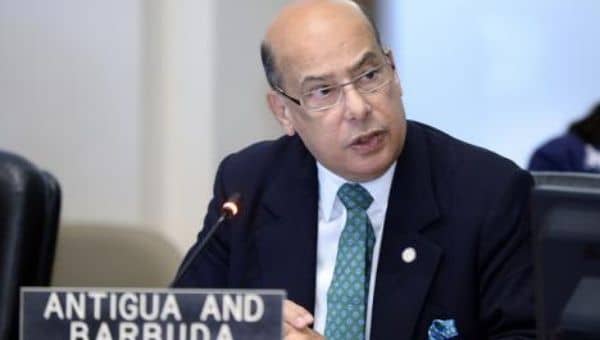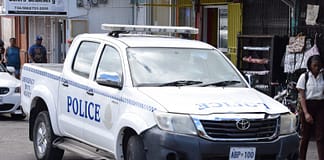
By Sir Ronald Sanders
(The writer is Antigua and Barbuda’s Ambassador to the United States and the OAS. He is also a Senior Fellow at the Institute of Commonwealth Studies at the University of London and Massey College in the University of Toronto. The views expressed are entirely his own)
The President of Guyana, David Granger, and the Opposition leader, Bharat Jagdeo, showed political maturity when they met on January 9 to try to resolve a constitutional crisis that could have led to civil strife and the destabilisation of Guyana.
They should be applauded for the good sense they have showed so far, and they should be encouraged to continue to place the national good of Guyana before narrow party-political interests.
The two political leaders met after a motion of no confidence against the government was passed on December 21 in the House of Assembly by 1 vote. A member of the government side, Charandass Persaud, voted in support of the opposition which had submitted the motion to the House.
The government is a coalition between APNU (mainly the Peoples National Congress) and the Alliance for Change (AFC). The coalition won general elections in May 2015 by a razor-thin majority of one seat in the 65-seat legislature. Guyana’s electoral system provides that the leaders of the electorally-successful political parties name a slate of representatives to the National Assembly based on the number of seats won by the parties. Charandass Persaud was named by the leader of the AFC, the smaller party in the coalition government.
Early reports of the meeting between Granger and Jagdeo indicate that agreement was reached on three critical matters without which Guyana would most certainly have been plunged into chaos.
The three matters are: the Constitution of Guyana will be respected, meaning that general elections will be held within 90 days of the December 21 no-confidence vote or such longer time as the Assembly agrees; appeals to the Court by various parties concerning the validity of the no-confidence vote will proceed and the political parties will make representation to the Court for an expedited decision with which they would abide; and the political parties will meet the Electoral Commission to determine its readiness to hold general elections and to agree measures to advance the process.
Had the leaders not demonstrated this politically mature stance, the alternative would have been street protests and marches by the opposition Peoples Progressive Party (PPP), the heightening of political tensions and the potential for violence that would have harmed Guyana’s prospects just as oil production, by Exxon Mobil and other oil companies, looks set to make it the richest country in the Caribbean.
Of course, advantage would have been taken of any turmoil and political instability in Guyana by its adversaries, such as Venezuela which claims two-thirds of the country, to advance their cause even by military means. The unity of the Guyanese people is crucial to resisting territorial claims and maintaining Guyana’s sovereignty.
But, one issue remains outstanding. Opposition leader, Bharat Jagdeo a former President of Guyana, argues that, until elections are held, the government remains in office only as a ‘care taker’. President Granger says the Constitution makes no such stipulation.
This argument could become problematic unless the Court acts expeditiously to deliver a ruling on the case brought by the Government, challenging the validity of the no confidence vote. If the Court delays hearing the case and delivering a ruling, the political atmosphere will heat-up and could still lead to civil strife.
The need for urgency by the Court in delivering a ruling in an elections matter would not be new or unique to Guyana. For instance, the 2012 Law Commission Report in the UK on “Challenging Elections in the UK”, favoured the guidance of European Union’s Vienna Commission which stated: “Election law must guarantee the resolution of disputes within a period of time suited to the electoral process. It is crucial here to ensure that the outcome of elections is not delayed. This implies that the period between the filing of a complaint and when it is dealt with is very short”. The guidance goes on to say that, “all complaint and appeals should be determined once and for all within a maximum of two months”.
In the broad interest of every sector of the Guyana economy and every person in the country, reasoned, but swift, action is therefore required by the Court. Meanwhile, all parties should work to ensure that general elections can be held smoothly in an orderly and peaceful atmosphere.
To satisfy all sectors and groups within Guyana and outside of it, the main political parties should also agree to external observation of the entire elections process, not only of the elections period. And, that external observation should begin now. There are many organisations that could be approached to undertake this activity, including the (Jimmy) Carter Center, the OAS, and the European Union.
It would be in Guyana’s interest to seek external observation of the entire electoral process since it would allay fears of rigging, eliminate credible accusations of manipulation, ease tensions between political parties and their supporters, and create the atmosphere for peaceful elections in which the voters of Guyana decide the next government.
If the political parties are convinced of the national appeal of their programmes and of their popularity, they should have no fear in leaving the judgement to the people.
Mixed-up in the validity of the no confidence vote is a claim that Chandradass Persaud was a dual national and, in that circumstance, was disqualified from being a member of the National Assembly, let alone to vote. It turns out that there may be many other members from all the political parties in the Assembly who are also dual nationals and have voted on many motions and legislation. Whether an action of the National Assembly, once done, can be undone, throws up issues over the validity of all the actions the Assembly has taken while dual nationals have voted.
Of greater importance now is what happens going forward. At the present time, the Guyana Constitution prohibits a dual national from serving in the National Assembly. Therefore, no dual national should be put on the slate of any political party contesting the next general election unless they publicly and evidently rescind their nationality in any other country.
Further, those who are dual nationals in parliament now should own up to their situation and rescind their other nationalities immediately. Members of the Assembly are law makers. Law makers cannot be law breakers, particularly not knowingly.
Responses and previous commentaries: www.sirronaldsanders.com
10 January 2019
Advertise with the mоѕt vіѕіtеd nеwѕ ѕіtе іn Antigua!
We offer fully customizable and flexible digital marketing packages.
Contact us at [email protected]

















ACRIMONY AND MOCKERY – CRIMINAL INVESTIGATION
In the world of politics and with personal ambitions, invariably influenced by power, greed and corruption,’ no matter how selfish it may appear, no leader or aspirants has ever placed his head under the guillotine and said ‘…In the national interest, take it off.’
Moreover, none has ever volunteered so to do. Even when it was apparent that power was slipping away, they fought with tooth and nail to preserve it.
Sir Ron, as usual, a well reasoned commentary. However, you may have inadvertently omitted or overlooked something significant.
It has not only been seen as passing strange, but also boggled many minds by a certain approach by the toppled administration.
Here in this commentary, you speak to ‘…Dual Nationality,’ seemingly a critical factor that may have disqualified the parliamentarian in the first place in becoming a member of the National Assembly, now the administration appears to be speaking to ‘…Bribery.’
While it may appear that the featured Parliamentarian has caused a ‘…multi-party government’ to fall down, and might reasonably be seen as a ‘…personal interest vote,’ conversely, it could also be seen as a vote for administrative change, made in the national interest?
Obviously, if it was a ‘…razor thin majority’ [Para. 4], that had enabled the formation of the ‘…mix-up party government,’ it might be reasonable to say that his vote was among such majority that had enabled its formation.
Then made a ‘…Back-bencher,’ and presumably dissatisfied over policies and governance, is it not what is expected of a reasonable man may also be expected of a disgruntled parliamentarian? Seems logical and fair to anyone with high ideals and great expectations.
Yes, a Republic, and with all the brouhaha over the ‘…No Confidence Notion,’ guided by parliamentary principles and procedures, why has it now become necessary to foist upon the Guyana Police a duty in mounting criminal investigation into the conduct of the ‘…featured parliamentarian Chandradass Persaud?’
Is not Parliament has powers to set up ‘…an investigation committee’ to cause investigation into the conduct of its members?
NOW: ACRIMONY AND MOCKERY
Seemingly exercising a constitutional right in following parliamentary procedures, ‘…Was it now to be considered proper to have tasked the Commissioner of Police with investigation into bribery allegations? [SL. News Online: January 11, 2018].
From professional perspective, such may not only be easily interpreted as an egregious act, but also one of ‘…Acrimony and Mockery’ in using the police service. This on the premise, ‘…if the end justifies the means.’
Very good insights, and we should all wish Guyana well as it navigates this constitutional crisis. The rule of law should prevail. I am keenly interested in the observation that: “Law makers cannot be law breakers, particularly not knowingly.”
I agree with this sentiment, so my question to Sir Ron is this – Why are you encouraging and supporting Prime Minister Browne to violate the Banking Act and the Revised Treaty of Chaguaramas, in respect of the Bank of Nova Scotia/Republic Bank matter? Or is it that that dictum does not apply to Antigua?
Comments are closed.